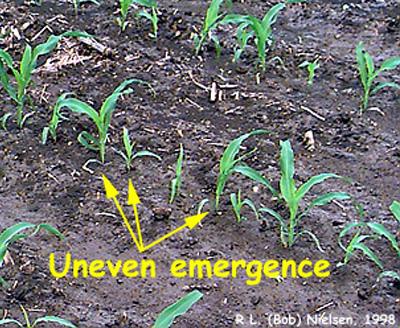
- Plant at least 1.50-2.00” deep and thoroughly clean rows of residue for even emergence
- Hybrids adjust their maturity by 6.8 GDU per day for everyday past May 1st planting
- Field by field differences in residue cover and soil moisture content, combined with forecasted cooler than normal temperatures can warrant increases in planting populations
Regardless if you live at a latitude equal to the farthest reaches of southern Illinois or the northern part Illinois it is time to plant. With soil temperatures still rather cool for this time of year, germination could be drawn out over a matter of a couple to several weeks. With the condensed later planting season, it would be wise to choose a few of the first planted field in your area as sentinel fields for early detection of emergence challenges.
Corn requires 110-120 GDU’s to emerge. Fluctuations in soil temperature can vary the rate of germination processes within the seed leading to various non-emerging plants. The old adage “If planting early, plant shallow” is a dangerous practice. Plant at least 1.5” to 2” deep to help cushion seed against night/day soil temperature variations to promote even emergence. While soil moisture is key to the germination process, too much can further slow the soil warming by increasing the amount of heat needed to warm the soil. Pay attention to the amount of and type of residue left over the planted row after first planter pass in each field. Areas of a field free of residue versus residue can vary as much as 5-10⁰ F resulting in slowed emergence. Properly set row cleaners should remove all residues from the planted row, but not leave a valley. Seed planted in these valleys can be subject to excess soil moisture accumulation and/or sediment deposition from the adjacent valley walls further slowing emergence. Always strive to plant hybrids with better emergence and early vigor scores first. The end goal being uniform emergence with limitation of V-stage differences greater than two leaf stages (Image 1) and as few 1 foot or greater gaps as possible per acre.
While corn is primarily a heat sensitive crop, it does possess some daylight sensitivity similar to soybeans primary driver to lifecycle changes. Purdue University found that for every day past May 1st hybrids need approximately 6.8 GDU’s less to reach black layer. This being said a hybrid requiring 2750 GDU’s to black layer would only need 2546 GDU to reach physiological maturity. Hybrids planted under later than usual situations carry approximately the same moisture content at black layer and dry down according to stated company characteristics ratings.
Under later planting dates, hybrids are typically taller due to warmer growing conditions during V-stages. Additionally, a higher percentage of plants emerge due to more favorable soil temperatures during germination. Planting higher populations due to late planting dates becomes more a question of the actual soil temperature at planting, extended weather forecast, individual field conditions and hybrid ratings rather than calendar date. Pre-emptively assess the level of risk for poor emergence by asking yourself these questions.
- Does the extended forecast look as though it supports maintaining soil temperatures in the 50⁰F or greater range at seeding depth (assuming seed placement at 1.5-2.0” depth).
- Keeping in mind the greater the soil moisture content at or after planting the harder to maintain or increase soil temperature
- Do you have row cleaners capable and set properly to remove all crop residue from the row area?
- Keep in mind the type of residue, corn versus soybean and the amounts left and each one’s ability to insulate the ground
- Does the hybrid have good emergence and early vigor ratings?
- Does the hybrid have good ratings for stalk rot, stalk strength, root strength and leaf disease handle increasing plant population?
The goal, as always is to get the job done right the first time. As we all know, replant corn rarely yields as getting it done right the first time.
Image 1- Late emerging plants, greater than 2 V-stages (Source: R.L Nielsen, Purdue University)